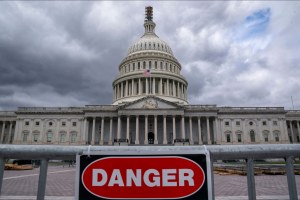More Americans consider issues like weakening democracy and political polarization to be critical threats to the United States than foreign adversaries.
Although the world is brimming with uncertainties, the 2023 Chicago Council Survey finds that Americans are far more concerned about threats within the United States, like weakening democracy and political polarization, than they are about threats outside of the country, like terrorism and the nuclear programs of other countries. Conducted on September 7–18, 2023, the survey also reveals deepening partisan divisions in perceptions of threat posed by issues like climate change and immigration.
Key Findings
- When asked whether internal or external threats are more concerning, eight in 10 Americans (81%) say they are more concerned about threats within the United States. Just 19 percent are more concerned about threats outside of the country.
- Greater percentages of Americans consider weakening democracy in the United States (69%) and political polarization (61%) critical threats compared to international terrorism (52%), the nuclear programs of North Korea (52%) and Iran (49%), or the military power of Russia (46%).
- There are large partisan divisions in the perceptions of threats posed by climate change (66 percentage point partisan difference in critical threat) and immigration (54 percentage point partisan difference in critical threat).
Americans are More Concerned About Threats at Home
Despite escalating geopolitical tensions around the world, 81 percent of Americans express concern about threats within the United States compared to 19 percent who are more worried about threats originating outside of the country. This substantial disparity suggests that domestic issues are far more salient in the daily lives of Americans than global challenges.
Across the board, Americans of all partisan affiliations agree that threats within the United States are more concerning than threats outside of the country. Although Republicans are slightly less concerned about internal threats (77%) than Democrats (82%) and Independents (82%), partisan attitudes toward internal and external threats are highly consistent.
Weakening Democracy and Political Polarization of Top Concern
When asked about a series of potential threats facing the United States, Americans are most likely to say that cyber-attacks on US computers (72%) are the most critical threat—an issue that can be directed by an actor inside or outside the United States. But majorities also consider weakening democracy (69%), and political polarization (61%) to be critical threats. In fact, the linkages between these three items might suggest that Americans are aware of the world’s entrance into the digital age and its implications on democracy and politics within the United States.
Even so, Americans are keeping a close eye on other global challenges, with most seeing the development of China as a world power (58%) and a global economic downturn (54%) as critical threats. Less than half of Americans (46%) view the military power of Russia as a critical threat to the United States, despite its war with Ukraine and challenge to the North Atlantic Treaty Organization (NATO ). Even fewer Americans (42%) see immigration as a critical threat to the United States. Although most Americans recognize the historical contributions of immigrants to the nation’s fabric, this points to a substantial segment of the population that may be concerned by potential security threats at the southern border.
Sharp Partisan Differences in Perception of Threat Posed by Climate Change and Immigration
Taking a deeper look at the perception of critical threats across partisan groups reveals areas of bipartisan consensus and other areas in which Republicans and Democrats sharply diverge. Majorities of Republicans and Democrats concur on the critical threats posed by cyber-attacks (74% Republican vs. 72% Democrat), weakening democracy (73% Republican vs. 73% Democrat), and political polarization (62% Republican vs. 64% Democrats)—even though they likely have different ideas of who is to blame for these latter two problems.
Republicans also tend to place relatively greater emphasis on traditional security issues than their Democratic counterparts, as evidenced by their heightened focus on international terrorism (59% Republican vs. 50% Democrat) and the nuclear ambitions of Iran (56% Republican vs. 45% Democrat).
Partisan Divides Continue to Widen and Reach New Heights
According to polling by the Chicago Council on Global Affairs, attitudes toward the critical threat posed by immigration and climate change have become increasingly polarized over the course of the last two decades. When Americans were first asked about the threat posed by large numbers of immigrants and refugees entering the United States in 1998, similar percentages of Republicans and Democrats (56% and 58%, respectively) found such to be a critical threat. Since then, the partisan divide in the perception of threat posed by immigration has grown to a difference of 54 percentage points—the highest it has ever been (see Appendix). Currently, 72 percent of Republicans consider immigration a critical threat to the United States, while just 18 percent of Democrats agree.
The partisan divide in attitudes toward climate change has similarly widened since 2008 and reached a staggering gap of 66 percentage points this year. However, unlike the partisan gap on immigration, which is driven by polarization in the perceptions of both Republicans and Democrats, the partisan gap on climate change is primarily driven by a heightened sense of concern for the environment among Democrats. A strong majority (82%) of Democrats consider climate change a critical threat, while only 16 percent of Republicans see it as such. Since 2014, the percentage of Democrats who see climate change as a critical threat has steadily increased, growing by about 31 percentage points and is also at its highest level since 2008. By contrast, the percentage of Republicans who think climate change is a critical threat to the United States has only increased by four percentage points over the same period of time.
Looking at shorter-term trends since 2018, the data show that Americans have grown less threatened by issues that have traditionally dominated US foreign policy in the last decade, like international terrorism (14 percentage point decrease) and nuclear proliferation (7 percentage point decrease in concern over North Korea’s nuclear program). Over the last six years, Americans have, instead, grown more threatened by the rise of China as a world power (19 percentage point increase) and political polarization (11 percentage point increase) (see Appendix).
Plurality of Americans Say Nuclear War is Most Concerning Threat to Humanity
While the previous question asked Americans to evaluate the extent of threat to the United States from a variety of sources, the Chicago Council Survey also included a separate question about a shorter list of potential threats (climate change, nuclear war, a pandemic, artificial intelligence and a deadly asteroid hitting earth) to all of humanity, not just the United States. In this case, far more Americans are concerned about the threat of nuclear war (37%) than the other four issues included in this question. Three in 10 Americans (30%) are most concerned about the threat that climate change poses to humanity, while even fewer (16%) see a deadly pandemic as most threatening to humanity, despite the recent outbreak of coronavirus. While headlines trumpet the dangers and promises of artificial intelligence (AI) Americans are far less concerned by the existential threat it poses (14%).
These data also highlight a clear divide in threat perception across partisan groups. Republicans—and to a lesser extent, Independents—are most concerned about the threat of nuclear war (50% Republican vs. 36% Independent), while only three in 10 (27%) Democrats consider it the most concerning threat. By contrast, Democrats are most concerned about the by climate change’s impact on humanity (50%), while only 9 percent of Republicans and 29 percent of Independents share the same sentiment. Republicans are also more likely to see artificial intelligence as a concerning threat to humanity than Democrats and Independents (22% Republican vs. 7% Democrat vs. 15% Independent). The threat of an asteroid strike remains a low concern among Americans of all political affiliations.
Below is a list of possible threats to the vital interests of the United States in the next 10 years. For each one, please select whether you see this as a critical threat, an important but not critical threat, or not an important threat at all.
This analysis is based on data from the 2023 Chicago Council Survey of the American public on foreign policy, a project of the Lester Crown Center on US Foreign Policy. The 2023 Chicago Council Survey was conducted September 7–18, 2023, by Ipsos using its large-scale, nationwide, online research panel, KnowledgePanel, in both English and Spanish among a weighted national sample of 3,242 adults 18 or older living in all 50 US states and the District of Columbia. The margin of sampling error for the full sample is ±2.0 percentage points including a design effect of 1.2908. The margin of error is higher for partisan subgroups or for partial-sample items.
Partisan identification is based on how respondents answered a standard self-identification question: “Generally speaking, do you think of yourself as a Republican, a Democrat, an Independent, or what?”
The 2023 Chicago Council Survey is made possible by the generous support of the Crown family, the Korea Foundation, and the United States-Japan Foundation.


Related Content
 Public Opinion
Public Opinion
But a majority of Americans support efforts to mitigate its effects.
 US Foreign Policy
US Foreign Policy
A plurality of Americans—and a majority of Republicans—also say that US leaders are not paying enough attention to US-China competition.
 Public Opinion
Public Opinion
But Republicans and Democrats are sharply divided when it comes to immigration levels.
 US Foreign Policy
US Foreign Policy
The public generally does not see current US trade policies toward China as benefiting Americans.


